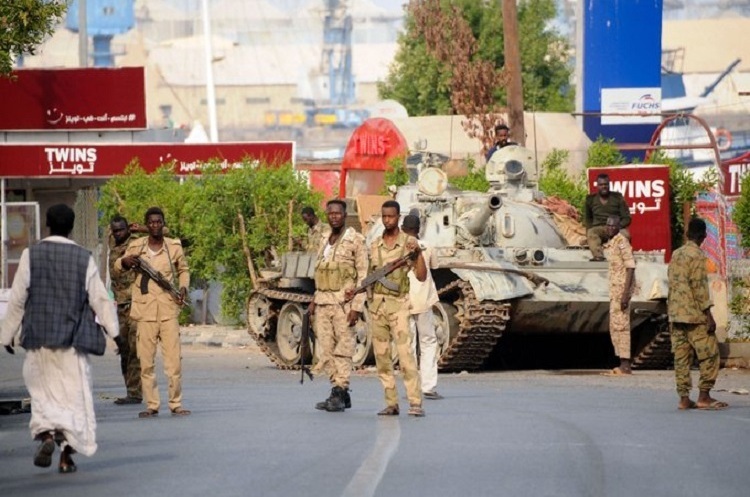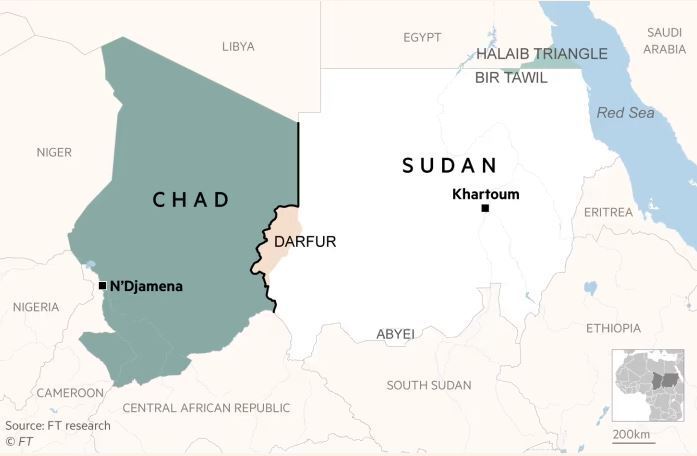Epidemics, pogroms and the capture of Chad: What the war in Sudan is leading to
Experts have described three crises that could result from clashes in Khartoum

The armed conflict in Sudan is unfolding in the worst possible scenario. The power struggle between two generals is being fuelled from abroad and is escalating into a civil war, which threatens to plunge the 5-million-strong city of Khartoum into chaos and destabilise the neighbouring 17-million-strong state of Chad.
As we reported earlier, fierce battles involving artillery, tanks and aviation erupted in the Sudanese capital, Khartoum, on 15 April. The regular army, led by Abdel Fattah al-Burhan, attacked the bases of the Rapid Support Forces (RSF) – a military formation subordinate to Mohammed Hamdan Dagalo.
In the first ten days of fighting, the Sudanese Ministry of Health counted 460 dead and 4,063 wounded. Hundreds of thousands of citizens have fled their homes. The residents of 5-million-strong Khartoum who remained are forced to hide from crossfire in buildings without internet, electricity and water supply in 40-degree heat.
Mind analysed the biggest risks of this conflict.
Spiral of violence in Khartoum
"The situation in the Sudanese capital at the moment is nothing short of catastrophic. Fighting is happening everywhere, even in residential areas, so citizens are not safe from stray bullets, shelling, or heavy artillery, even in their own houses. Even if they are not physically harmed, the horrifying noise and sounds of these heavy machinery and gun fights definitely reaches the entire population," describes the state of affairs in Khartoum by the Tahrir Institute for Middle East Policy.
Both generals who are hostile to each other believe that Khartoum will grant them power, wealth and authority, so they seek to take control of it at any cost. During the day, the Sudanese capital resembles a ghost town with empty streets and closed shops. When the shooting subsides, the residents of Khartoum go out to loot in order to stave off the fear of dying from hunger or thirst.
"Civilians are actually the ones looting some shops and factories. So, war is not only about shelling and shooting and so on," she said. "War is also about humanitarian needs. And if they are not met, you just see rising criminal activity, you see a state of complete chaos," explains writer Reem Abbas, who lives in Sudan's capital.
Several attempts to reconcile Sudanese generals have failed. According to experts, the forces of al-Burhan and Dagalo do not trust each other and are unable to reach an agreement. Both armies consider the armed struggle for power in Sudan existential and receive funding for it from foreign donors.
"The government has some kind of legitimacy because, after all, it is the official army. On the government side, you have the Egyptians openly supporting Gen. Burhan, the Israeli side also in there. You have the Saudis, the Emirates, you have Libya where warlord Khalifa Khaftar, who incidentally had good relations with the United States, but he is on the opposite side of the conflict," notes Kwaku Nwamah, Professor of International Politics at the American University in Washington.
The threat of war in Chad
According to Kwaku Nwamah, the United States, which has been trying to negotiate a ceasefire with Generals al-Burhan and Dagalo, is more concerned about its politically unstable western neighbour than Sudan itself.
"The U.S. is worried about Chad. Chad is a strong American ally. Russia is already in the vicinity in the Central African Republic," warns Nwamah. "If Hemedti wins this conflict, the Darfur region can become a starting base for Arab rebels who are challenging the government in Chad."

Experts describe Chad as an "anchor of stability" in the turbulent Sahel region. The military junta ruling the country is helping the West, particularly France, to suppress Islamist uprisings in Nigeria, Mali, and Burkina Faso. In return, Chad's regime receives diplomatic support from the European Union and the United States. However, the longer the junta remains in power, the stronger the country's discontent and the growing threat of rebellion and chaos, as in Libya.
"The regime of Mahamat Deby is a kind of pressure cooker. If left on for too long, the pressure inside the cooker will explode. Chad is torn apart by conflicts no less than Sudan. It has numerous different factions and militias," quotes the Financial Times Daniel Eisenenga, an expert at the African Center for Strategic Studies as saying.
Risk of biological catastrophe
On Tuesday, the World Health Organisation (WHO) sounded the alarm in relation to the seizure of the central government laboratory in Khartoum, containing dangerous disease pathogens. The powerless building is turning into a "microbial bomb" as refrigerators with biological and chemical materials are defrosting, and militants are not allowing technical experts access.
"The situation is extremely dangerous, because we have polio isolates in the lab, we have measles isolates in the lab, we have cholerae isolates in the lab," CNN quotes WHO representative in Sudan, Nima Saeed Abid.
If the bacteria escape, there will be nowhere to treat the infected. In Khartoum and its suburbs, 59 of the 82 hospitals have closed due to shelling, in which at least 18 healthcare workers have been killed. Overall, in the country, according to WHO data, only 16% of hospitals, medical centres, and clinics are functioning normally.
"On top of the number of deaths and injuries caused by the conflict itself, WHO expects there will be many more deaths due to outbreaks, lack of access to food and water, and disruptions to essential health services, including immunisation. WHO estimates that one quarter of the lives lost so far could have been saved with access to basic haemorrhage control. But paramedics, nurses and doctors are unable to access injured civilians, and civilians are unable to access services," said WHO Director-General Tedros Adhanom Ghebreyesus.
According to his data, due to the fighting in Khartoum, 24,000 women will not be able to receive obstetric assistance during childbirth. Patients with chronic kidney diseases, diabetics, cancer patients, and about 50,000 children suffering from malnutrition are being deprived of vital procedures. An epidemic of gastrointestinal diseases is almost certain to occur in Khartoum, as residents are drinking water from the river en masse, and an outbreak of Dengue fever has already been recorded with 1,344 confirmed cases of infection.
If you have read this article to the end, we hope that means it was useful for you.
We work to ensure that our journalistic and analytical work is of high quality, and we strive to perform it as competently as possible. This also requires financial independence. Support us for only UAH 196 per month.
Become a Mind subscriber for just USD 5 per month and support the development of independent business journalism!
You can unsubscribe at any time in your LIQPAY account or by sending us an email: [email protected]


